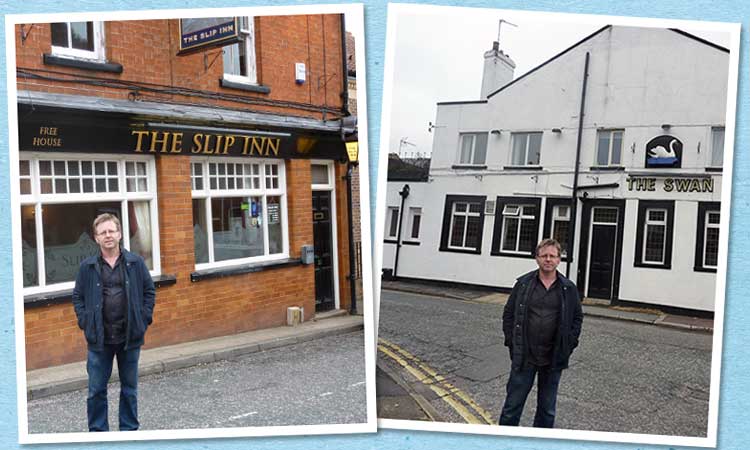 In his latest Good Beer Guide pubcast, York CAMRA’s Nick Love meets a man who bridges the gap that divides the industry
In his latest Good Beer Guide pubcast, York CAMRA’s Nick Love meets a man who bridges the gap that divides the industry
For a city blessed with such a wealth of real and craft ale pubs, and enriched by a plethora of fine microbreweries, it should come as no surprise that York is resident to a thriving micro pub company.
Paul Crossman and business partner Jon Farrow now own The Slip Inn, The Volunteer Arms and The Woolpack.
Unusually, as well as running his own three pubs, he is the leaseholder of a tied house – The Swan, just up the road from the Slip Inn on Clementhorpe.
I met with Paul at the Slip Inn to record this podcast interview. He is engaging and disarmingly open about his business and his experiences of dealing with a national pubco – Punch Taverns, owners of The Swan.
He talks about being in perhaps the unique position of having a foot in both camps and pulls no punches, which makes for compulsive listening. He says:
Listen here
The pubco problem
You have someone here who is in the direct line of fire of a national pubco and mitigates their pervasive competitive disadvantages by co-owning the three other freehouses.
We are in the midst of a major offensive against the insidious practices of the large national pubcos.
CAMRA and other consumer groups are petitioning the government for wide reaching legislation that would revolutionise the pub industry in the UK for the first time for decades.
The signs as I write this are promising, in that it will make it into the Queen’s Speech.
My interviewee leaves me in doubt as to the gravity of the situation:
He brings the challenges of running a tied house into stark focus.
The pub industry is still on its knees despite the renaissance of real ale and UK brewing. There are 28 hostelries per week closing due to the naked avarice of national pub companies who seem intent on wringing every last drop of profit from their pubs.
They exhibit a total disregard for the tireless licensees running them, of whom a staggering 84% earn less than £15,000 a year for their endeavours.
Paul confirms this statistic:
The large pubcos charge prohibitive rents. Not content with that they force their licensees to purchase beer at premiums up to 80% above free market prices available to competing pubs on the same street.
The Slip is just a few yards away. Yet it has access to free market prices that would sink The Swan were it not actually owned by Crossman and Farrow as well.
To have a foot in both worlds is rare though. Other landlords of tied houses have to compete against freehouses on their doorsteps who can put them out of business.
When their pubs are eventually driven into the ground and no longer profitable the pubcos then look to offload them to supermarkets or housing developers without a care at all for the impact on the local neighbourhood.
Few doubt that these companies are trying to avert this threat to their cash-cow by extending their tentacles into the highest possible tiers of government.
It would prove to be a tragedy if they succeeded.
Locals for locals

The pubs that Crossman and Farrow run are hugely popular because they “do the right thing.” They stock local beers, source local produce and charge competitive prices.
Crossman and Farrow also care for the people they employ, ensuring for instance that good accommodation for their managers is prioritised above pub redecoration.
They believe in serving the local “community” and indeed with The Volunteer Arms saved a community asset from oblivion, proving in the process that in the right hands it was never the failing business it was portrayed as by its previous owners.
Don’t confuse altruistic practices with philanthropy though.
Despite their self-effacing modesty and inferences that they make money almost by accident (they don’t draw an income but see their pubs as long term pension plans), these are two skilful businessmen who prove that you can make money without doing it at the expense of others.
They are collaborative, innovative and most importantly have an in-depth knowledge of their territory, which gives them a business agility that the nationals can only dream of.
These local entrepreneurs have a proven blueprint of the future – if the law is changed to dismantle the unfair business practices of the national pubcos, ensuring a level playing field for tied licensees, including fair market rents and equitable beer prices.
If pubco reform happened, licensees would be able to earn a fair wage commensurate with their abilities.
A huge new market would open up for the microbreweries that are the vanguard of the present beer revolution.
The consumer would have better choice at competitive prices and the whole industry would work to the advantage of the vast majority, instead of being cynically skewed to deliver dividends to a small group of shareholders and superannuated chief executives.
Most importantly, it would protect the social and architectural fabric of the nation by saving many pubs that are being artificially driven into oblivion which, as Paul Crossman’s pubs prove, would actually be commercially successful with the correct business model in place.
The man with direct knowledge of both business models sums it up perfectly:
